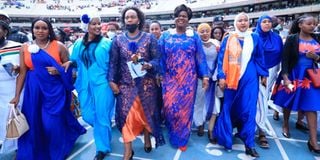Include rights of women in the manifesto

Women leaders arrive in style for Azimio la Umoja national conference held at Kasarani Stadium on December 10, 2021.
What you need to know:
- In this country, women and girls are suffering sexual and gender-based violence, teenage pregnancy and unsafe abortion.
- They don’t have access to clean water in the proximity of their homesteads or food security to guarantee a meal for their children.
It’s the season of ‘Warembo na..., ‘Wasichana wa...’, ‘Women 4...’ and so on. Rarely would you hear ‘Wababa na...’ or even ‘Men 4...’. For politicians angling for elective posts, it is always easy to use women for campaign branding. It is during this ‘Wadada na so-and-so’ that the political class assumes women are meaningfully engaged in their campaign agenda.
That must stop. It’s time for the political class to take women’s issues seriously and as the big economic agenda they propose in their campaigns but are conduits for corruption if not properly managed. Politicians are busy using women and creating the ‘Warembo na...’ and ‘Akina dada na...’, but where is the agenda that specifically outlines their plan to improve the health and social wellbeing of women?
In this country, women and girls are suffering sexual and gender-based violence, teenage pregnancy and unsafe abortion while patriarchal dominance has greatly contributed to gender inequality. They don’t have access to clean water in the proximity of their homesteads or food security to guarantee a meal for their children. They cannot even easily access sanitary towels.
Regressive cultures
The political class is selling hope that is a mirage to many and does not resonate with the individual needs of voters, especially women. It’s time to include the fundamental rights of women in the political manifesto.
Politicians must tell us what they will do to ensure women are accessing sexual and reproductive health services unhindered; sanitary towels are available for girls and women uninterruptedly; regressive cultures that hinder women from decision-making platforms are eliminated; water and food security is guaranteed; and laws and policies that address gender inequalities will be enacted .
In addition, women must challenge the political class and ensure that women’s rights is part of the mainstream agenda but not an appendix in the manifesto. Until women are able to fully exercise and enjoy their fundamental rights, gender inequality and inequity will continue.
Mr Ochieng is a programme manager at SRHR & Advocacy Trust for Indigenous Culture and Health. [email protected]




